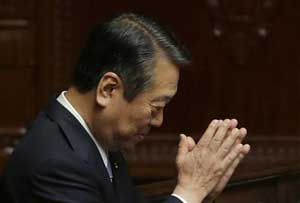02 Jul 2012 - {{hitsCtrl.values.hits}}
 Japanese political heavyweight Ichiro Ozawa and 51 other lawmakers will quit the ruling party over a plan to increase the sales tax, an aide said on Monday, although the government will retain its majority in the powerful lower house of parliament.
Japanese political heavyweight Ichiro Ozawa and 51 other lawmakers will quit the ruling party over a plan to increase the sales tax, an aide said on Monday, although the government will retain its majority in the powerful lower house of parliament.
28 Dec 2024 5 hours ago
28 Dec 2024 5 hours ago
28 Dec 2024 9 hours ago
28 Dec 2024 9 hours ago
28 Dec 2024 9 hours ago